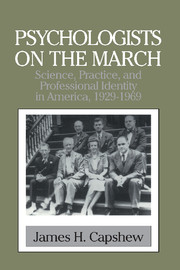Book contents
- Frontmatter
- Contents
- Acknowledgments
- List of Abbreviations
- Introduction: The Psychologists' War
- Interlude I
- 1 Growing Pains: After the Great War
- 2 Mobilizing for World War II: From National Defense to Professional Unity
- 3 Home Fires: Female Psychologists and the Politics of Gender
- Interlude II
- 4 Sorting Soldiers: Psychology as Personnel Management
- 5 Applied Human Relations: The Utility of Social Psychology
- 6 From the Margins: Making the Clinical Connection
- 7 Engineering Behavior: Applied Experimental Psychology
- Interlude III
- 8 A New Order: Postwar Support for Psychology
- 9 Remodeling the Academic Home
- Interlude IV
- 10 The Mirror of Practice: Toward a Reflexive Science
- 11 Beyond the Laboratory: Giving Psychology Away
- Interlude V
- Epilogue: Science in Search of Self
- Index
1 - Growing Pains: After the Great War
Published online by Cambridge University Press: 06 July 2010
- Frontmatter
- Contents
- Acknowledgments
- List of Abbreviations
- Introduction: The Psychologists' War
- Interlude I
- 1 Growing Pains: After the Great War
- 2 Mobilizing for World War II: From National Defense to Professional Unity
- 3 Home Fires: Female Psychologists and the Politics of Gender
- Interlude II
- 4 Sorting Soldiers: Psychology as Personnel Management
- 5 Applied Human Relations: The Utility of Social Psychology
- 6 From the Margins: Making the Clinical Connection
- 7 Engineering Behavior: Applied Experimental Psychology
- Interlude III
- 8 A New Order: Postwar Support for Psychology
- 9 Remodeling the Academic Home
- Interlude IV
- 10 The Mirror of Practice: Toward a Reflexive Science
- 11 Beyond the Laboratory: Giving Psychology Away
- Interlude V
- Epilogue: Science in Search of Self
- Index
Summary
“Enfin! Enfin en Amérique!” exclaimed Edouard Claparède at the opening session of the Ninth International Congress of Psychology in early September 1929. The French psychologist was welcoming more than eight hundred colleagues from around the world who had gathered at Yale University to participate in the first such international meeting ever held in the United States. From the time of the First International Congress of Psychology that took place in 1889 in Paris, proposals had been made to hold a meeting in America, but political and economic circumstances had intervened. Finally, on the fortieth anniversary of the first congress, delegates from twenty-one foreign countries convened in New Haven, Connecticut. Although most hailed from Europe and the Soviet Union, there were also representatives from China, Japan, India, Australia, New Zealand, Egypt, and Brazil. Outnumbering their foreign guests nearly seven to one, American psychologists were proudly demonstrating the growth and prosperity of the discipline in their country.
The Ninth International Congress signaled that American psychology had come of age. Scientific psychology had begun in Europe during the latter part of the nineteenth century and was soon imported to North America, where it flourished with remarkable vigor. According to the 1929 Psychological Register, an international directory, there were more professional psychologists in the United States than in the rest of the world combined. The United States also led the world in producing knowledge in psychology, outstripping Germany in the 1920s and contributing over one-third of the total number of published papers in the field by the end of the decade.
- Type
- Chapter
- Information
- Psychologists on the MarchScience, Practice, and Professional Identity in America, 1929–1969, pp. 15 - 38Publisher: Cambridge University PressPrint publication year: 1999

